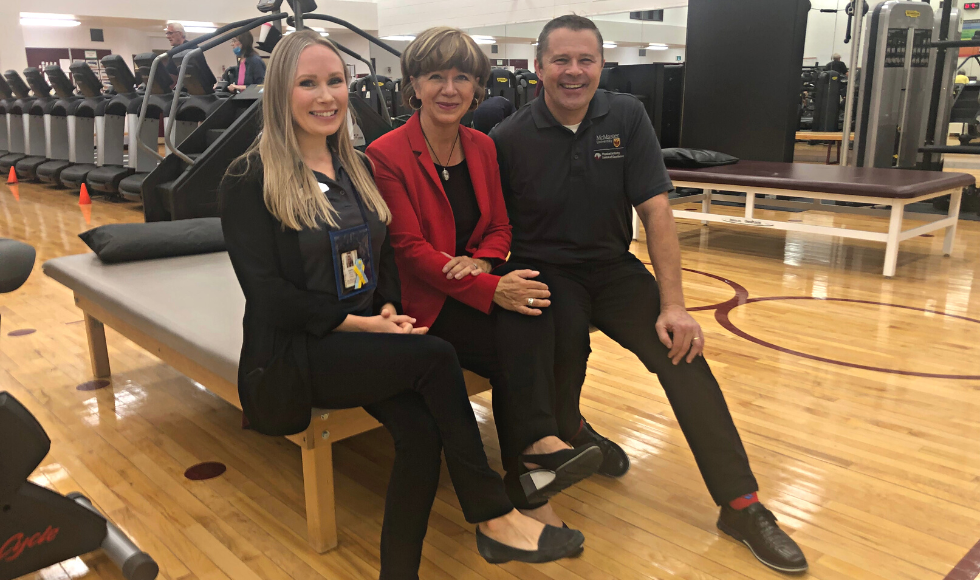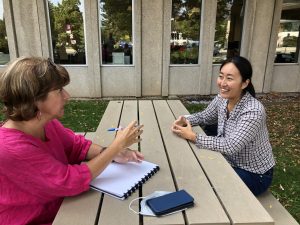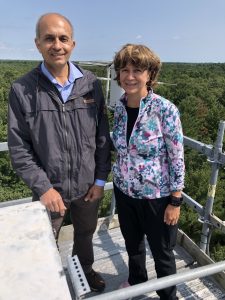Faculty and students give journalist in residence a master class in hope

As part of her stint as the Faculty of Science’s inaugural journalist in residence, Avis Favaro met with dozens of faculty and students from across the university, including the Physical Activity Centre of Excellence’s Stuart Phillips and Angelica McQuarrie.
It’s been four weeks of unlimited brain candy for Avis Favaro at McMaster University.
The award-winning broadcast journalist is in her final week as the Faculty of Science’s inaugural journalist in residence.
When her residency ends Friday, Favaro will have met with dozens of faculty and students from across the university and toured research facilities including the McMaster Nuclear Reactor, the Physical Activity Centre of Excellence, LIVELab and the McMaster Centre for Climate Change’s Turkey Point Observatory.
“The phrase I’ve been using a lot is brain candy,” says Favaro when she’s been asked to describe her residency at McMaster.
“It’s like being in a candy store filled with brilliant people who you get to spend time with and sample their research, without the pressure of working to deadline and shoehorning everything I’ve learned into a 110-second story.”
Faculty and students have left a lasting impression on Favaro. “Every time I’ve walked into classrooms and labs at McMaster, it felt like I was walking into rooms full of hope. I’ve been so impressed with the enthusiasm of all the researchers I’ve met. There’s a fire burning in them as they look for answers to questions that could make such a huge difference. There are so many stories that deserve to be told here and so many remarkable people working on projects that will in many ways make the world a better place.”

Favaro, who spent nearly 40 years with Global TV and CTV National and received an honorary degree from McMaster in 2018, says the media industry is rapidly changing and scientists will need to find new ways to showcase their research and build support for science.
Helping faculty and students build the confidence to connect and communicate with journalists and the general public is the reason why the Faculty of Science launched a journalist in residence program. “Science communication is a priority for our Faculty of Science and Avis has done a wonderful job of advising and inspiring established, emerging and future researchers,” says Dean Maureen MacDonald.
Researchers say meeting with Favaro was time well spent. “It was a wonderful opportunity to learn from someone with such a distinguished career in media and who has a deep interest in health research,” says Katrina Choe, an assistant professor with the Department of Psychology, Neuroscience & Behavior. “I found Avis’ media interview coaching to be quite helpful.”

Altaf Arain, director of the McMaster Centre for Climate Change and a professor in the School of Earth, Environment & Society, took Favaro to the top of a scaffolded research tower above the treeline near Turkey Point Provincial Park. “I very much enjoyed our discussions with Avis about our climate, environment and forest research. She asked thought-provoking questions and was very engaging with our students.”
Favaro has one final piece of advice as her residency draws to a close. “Connecting people to each other is one of the things that journalists do well. I was surprised that some scientists don’t know what their fellow researchers are doing just a few lab doors down the hall. If I had one wish, it would be for more researchers to connect with each other. Connections create power and potential.”
The Faculty of Science plans to continue the journalist in residence program in 2023.


